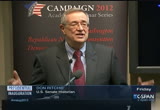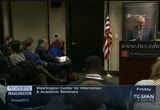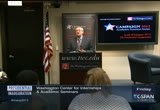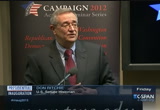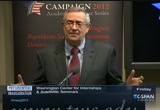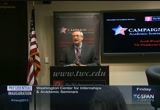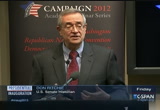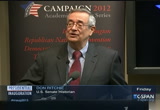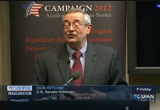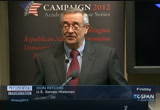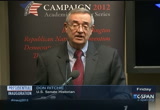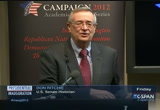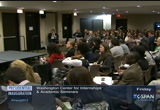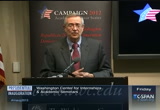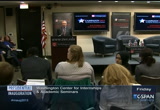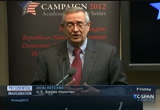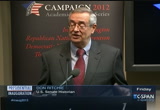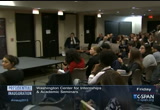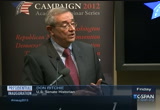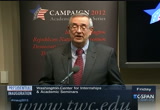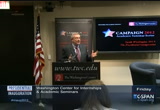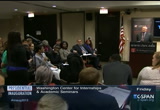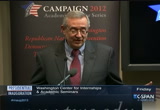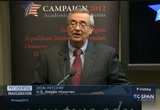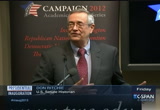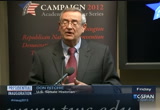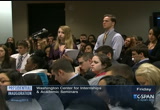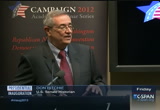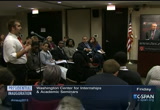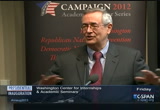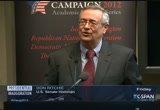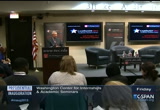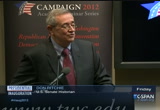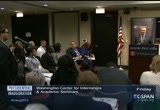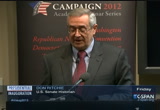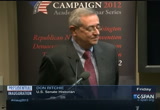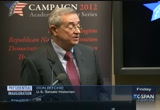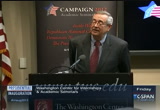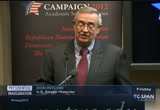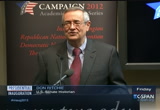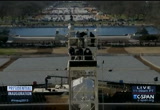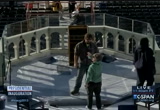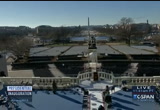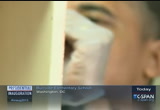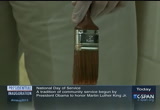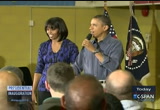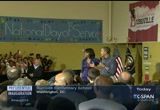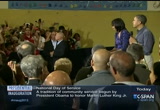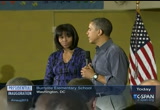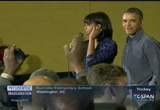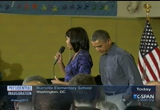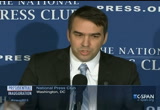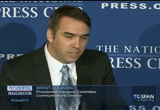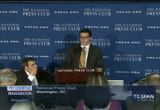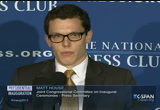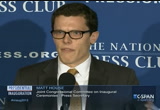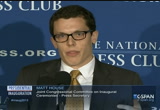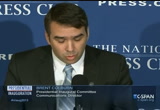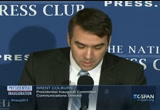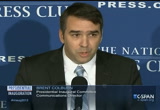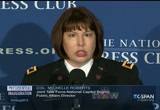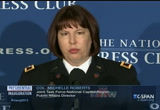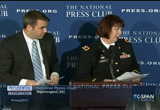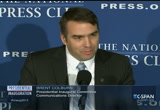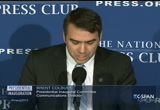tv Rep. Sander Levin D- Mich. CSPAN January 19, 2013 2:00pm-3:05pm EST
2:00 pm
-- the first thing they have to do is appoint their own inaugural committee, the cousin after the president leaves the congress, everything is taken -- because after the president leaves the congress, everything is taken over by the committee. they have a staff of everything we do of but the capitol is paid for by the government. once the president leaves and heads to the white house, his committee has got to pay for everything. the paper all things related -- they pay for all things related to the balls. raising the funds for private sources to underwrite what is going on. ronald reagan gets a lot credit for moving the inauguration when he did not move the inauguration. he moved the inauguration of four years later. that was in 1985.
2:01 pm
it was below 7 degrees. it was a bitter cold day in washington. the reagan white house the night before looking at the weather forecast thought it was cruel and unusual punishment to make people outside in this weather. they call the chairman of the rules committee and the inaugural committee and said, we think it should be moved aside to the rotunda. being part of a joint committee, he thought the best thing was to call tip o'neill. it was finally tracked down in a bar where he was watching a basketball game kindre. said, it is his inauguration he should have it where he wants it.
2:02 pm
congress cooperated and move it aside. -- moved it inside. most people saw it on television at that point. the architect of the capital said, i would be impeached if i moved the inauguration inside because there are so many people coming to washington. a lot of inauguration's have been held out in pretty miserable weather. there was a blizzard going on when william howard taft was inaugurated. the still have a completely outdoor ceremony. -- they still had a completely out door certainly. it was part rain for herbert hoover. he and his wife rode in an open car . john f. kennedy had a blizzard
2:03 pm
the night before his inauguration. students came out to help shovel snow so they could have a parade the next day. people who want to kennedy's inauguration, the first thing they talk about is whether that date. ather that day.a what about the vice president? it used to be there was a tradition that the vice- president got his own inauguration. when the congress and presidents to use to begin their terms on march 4, the first thing that would happen is the house and senate would me to swear in their new members. the first and had to do was where in the vice president -- think they had to do was where in the vice president. presidents of united states used to go to the senate chamber to watch their vice president be sworn in.
2:04 pm
the senate is to give the vice- president a chance to deliver his own inaugural address. i am sure joe biden would love to have that opportunity. it did not always work out well for vice presidents. in 1865, lincoln's second term, that's significant speech will remember -- that magnificent speech, healing speech -- his vice president was ander johnsorew johnson. affusion ticket in 1864 -- a fusion ticket in 1864. johnson arrived with the flu.
2:05 pm
he gave, for what it was all accounts, a completely inebriated address. lincoln was mortified. it said the public image -- set the public image of andrew johnson. another disastrous vice- presidential inaugural address was calvin coolidge's. he used that opportunity to state and how the filibuster should be done away with. president roosevelt's second inauguration, that is when the congress started before the president. now presidents and vice presidents began to be sworn outside of the steps. there was one exception in the
2:06 pm
long tradition of inauguration's being held in the capital. that was in 1945, when franklin roosevelt was being sworn in for a fourth time. he was the only president of united states to serve more than two terms. his third inauguration was of the capital. his fourth one was in the middle of world war ii. he felt this is not the opportune time to have endean elaborate inauguration. it decided to move the inauguration today in front of the capital. could he do that? he did. the joint inaugural committee was not happy with that decision. the president of united states can decide above and beyond the date and time they're being sworn in. -- in, among other things.
2:07 pm
we move them from the east front to the west front. the crowd had been getting bigger and bigger. one reason to have them on the west front is because you could accommodate more people. if you look to the photographs of the last several inauguration's, you can measure the crowd by how far it goes back. when ronald reagan was the first sworn in, the crowd went back to maybe a block beyond the reflecting pool. with each inauguration, the crowd gets further back and for the back. until 2009, when there was so many people but they went all the way back to the washington monument. crowded on to the mall, on one of the coldest days in washington. it was a nice atmosphere. one of the most remarkable things is you had a million and a half people standing dried there was not a single arrest made that -- standing.
2:08 pm
there was not a single arrest made that day. they did need to have a lot of medical assistance. there's always somebody who is going to collapse and need assistance. they bring in trailers with doctors and nurses around to be able to treat. despite the fact we had increased security, it was a very peaceful day. not everyone agrees with the inauguration. there is always a dissenter. the secret service and police reserve spaces outside, particularly on the parade route, for groups of the call first amendment groups. , under the first amendment, you have the right to peacefully demonstrate, to speak out and assembled. inaugurations have incorporated
2:09 pm
that. i recall inaugurations during the vietnam war when there were demonstrations and protests despite what the assigned areas were along the way. from the president to his opponents, everybody sees some importance in the ceremonies involved in this. the other thing that has happened is that more people to see it to are not in washington. in the 19th century, if you were in washington, you read about it -- if you were not in washington, you read about it in the newspapers. in the 1940's, you could watch it on television. and now it is web cast around the world. the audience for the inauguration is enormous. that is an important moment for the president as well. it is his moment to speak not only to the entire country, but
2:10 pm
the entire world. inaugural addresses tend to be more eloquent and they tend not to be as specific as the state of the union message. the state of the union message is essentially a laundry list. inaugural addresses tend to rise above that. some of them have been incredibly eloquent. lincoln's was carved on the wall of this monument. the -- his monument. a lot of other addresses have not perhaps present that level, but presidents are always striving for that degree of eloquence. the big excitement is the first inauguration. there is never as big of a crowd for a second inauguration. people say, why do they need all this ceremony?
2:11 pm
it is still an important moment. if you look at recent history, less than half of our presidents have had the opportunity to have a second inauguration. the ones who do often have a clearer sense of what they want to accomplish. after four years, they've gotten a better sense of what your administration is about. lyndon's first inauguration, he is begging people not to leave, -- melancon's first inauguration, he is begging people not to leave. -- lincoln's first inauguration, he is begging people nto to leave. -- not to leave. a second inauguration that is particularly memorable as franklin roosevelt's. by 1937, franklin roosevelt knew
2:12 pm
what the new deal was about. his second inaugural address was much more specific and is really arguing for continuing the crusade. it is his speech about seeing one-third of the nation still ill fed and ill clothed. second inaugurations are often much more pointed as far as the president is concerned. what should you look for in his inauguration? it is going to be a coming together. it is going to be the legislative branch hosting, the chief executive sworn in by the cheap justice of the supreme court -- chief justice of the supreme court. huge numbers of the public will be there to see what is going on. i think the fact that congress continues to hold his inaugurations -- these inaugurations is it a sign that
2:13 pm
we're coming together. -- is a sign that we're coming together. as a historian, i never like to predict the future. until people i like to predict the past. -- i tell people i like to predict the past. i will absolutely predict that monday's inaugural address will and the way i am going to end right now, which is thank you, god bless you, and god bless america. [applause] i have been asked to open the floor for questions. >> , a history major.
2:14 pm
i was wondering as a history major, how do you feel when politicians and misinterpret the philosophies of the founding fathers. thi body seems to >> we have a lot of people who are convinced that they know what james madison wanted. there are a lot of things in the constitution that came about as compromises. it bothers me a bit when everyone says, this is what the founding fathers meant. we historians are not certain what the founding fathers meant. we have to make a good-faith effort to interpret. we go to their diaries and other materials to understand. you asked about what it would think about the government
2:15 pm
today. i think two things. it would be surprised about how much the government still resembles the government that they drafted. the u.s. senate today has every power that was given to it by the constitution in 1789. almost every other government in the world has an upper house tested in a way power from the upper house -- has taken away power from the upper house. the presidency has grown. they thought the presidency should be a strong institution, and that is one reason why the rallied with george washington. what would astonish them is the size of the government. and the size of the country. there would be astounded at how big the federal government had gotten. i think it would take the breath away. and that would probably also be astonished at the salaries of
2:16 pm
one is getting, and the office space -- and they would probably also be astonished at the salaries and the office space that everyone is getting. it is still very close to the institution they created. >> based on your access and longevity, honorable longevity in your field, whose reforms do you think for most effective incorporating the inaugural activities, -- most effective in the inaugural activities? corks the doorway and reappear >> they begin a year in advance. they start working their way through this process.
2:17 pm
i happened to a lot of the joint meetings. it is a lot like planning d-day. so many people coming in from out of town. it is a phenomenal practice. to give credit to the president also committee, they do not have anywhere near as much time as the jcc does. the people for running president obama's second inauguration are the same people who ran his first inauguration. they know the ropes. it will be hard for the next president coming in to do something like this. the one thing they all find in the end is there is an enormous demand for tickets. there is still a greater demand beyond however many tickets you print. they have tried to accommodate the crowds by putting up very large screens along the mall, sound systems so you can see and hear things.
2:18 pm
the promise there will be an adequate number of court upon a-potties. >> how will this inauguration be different from the first inauguration, what can we expect to hear from him in his inaugural address? >> it will not be as big. they kept the number of buses that have been written. it is not running -- rented. it is not running nearly as big as it was. they still expect that the crowd at the second inauguration will be larger than the average crowd. it will be hard to meet that 1.5 million or so from before that. as for what the president says, my suspicion is -- and the
2:19 pm
second time around, presidents have a clearer idea of what they can do. i suspect there will be more specific goals as to where he wants to lead us this time. i have not spoken to his speech writer. i cannot give you any inside tips on that. >> i am studying history and museum studies. i am interested in knowing in hearing about what you think the most significant development is in the history of the inauguration. >> the media developments, the fact that inaugurations are now sold internationally broadcast is the most important part -- are now internationally broadcast is the most important part that has changed over time. everyone wanted to see george washington sworn in. but there were not that many people who could get to new york.
2:20 pm
even andrew jackson, but the time you get real gross coming -- by the time you could get railroads, people were shocked by the amount of people who came to see him. that would be a small lumber today. -- a small number today. >> i have the pleasure of meeting you on the senate floor, when i took a trip with suffolk university garret. ever since that day, and have had the same question. -- i have had the same question. he came out with a book, defining the filibuster. however exactly do you feel with all of your experience on the
2:21 pm
filibuster -- how exactly do you feel with all your experience on the filibuster? >> there is a division between political scientists and historians about this. political science will look at the system and say, what is wrong with this. the historian will look at it and say, how to get this way -- how did it this way. we tend to be less active in suggesting changes to the system. floyd riddick said, the rules of the senate are perfect. what he meant by that was, the senators have exclusive control over writing their own rules. these are the rules that have written, and this is what i carry out. if the want to change them, they will change and to fit their circumstances.
2:22 pm
-- and them to fit their circumstances. the have been filibustering since 1789. -- they have been filibustering since 1789. the senate and house have developed in remarkably different ways over time. the constitution said, each house to right the wrong roles. age house can write their own rules. -- the house can write their own rules. you come to the senate. the rules of the senate have always given much more muscle to the minority. sometimes it is the minority party. sometimes it is a minority faction inside a minority part to says, "i object," and
2:23 pm
everything stops. every senate majority leader is under a lot of burden to try to get the very core and cooperative organization to work together. -- to get a very uncooperative organization to work together. the concept of rules giving the minority some clout in the senate, they have to forge bipartisan. the senate was able to pass bipartisan majorities a farm bill. a post office bill, and the fiscal cliff. the house did not pass any of those things. it finally passed the fiscal cliff because the speaker took off the lid and said, everybody can vote on it.
2:24 pm
the reason for the difference is because the have majority rule in the house, people look on it as a sign of weakness. the speaker of the house has to go to the minority party for support. the speakers of the house only want to proceed is to have majority of their own parties. the farm bill did not pass. the housing bill did not pass. even though they are generally supportive and people are waiting for the farm bill to pass. the filibuster cannot create as much of a gridlock as majority rule did. -- did not create as much of a gridlock as majority rule did. some of the senior senators are looking for solutions to of all. they're going to see some modifications. i do not think that filibuster is good to go away. i think it will try to get -- going to go away.
2:25 pm
i think they will try to get over some of the speed bumps. professor,a terrific i did an oral history with him. his interview is on the senate website. >> i majored in politics. my question today, is a reasonable believe that president obama's second term will be similar or different from his first, considering that the same economic crisis still exists, even though you mentioned that the second inauguration is traditionally about more specific, what you want to talk about, now that he no longer has to run for reelection? >> second terms have been baffled totally unpredictable things. franklin roosevelt -- second terms have been filled with
2:26 pm
totally unpredictable things. franklin roosevelt, you would think he was completely in charge. the first thing he did was to ask her to increase the size of the supreme court. for support to increase the size of the supreme court. richard nixon took the oath of office after winning a huge victory in 1972. in 1973, he was on top of the world. a year-and-a-half later, he was resigning because of the water watergate scandal. there are a lot of things that you cannot predict. you hope that president after the first term are much more in control of what is going on, but circumstances are going to be beyond their knowledge at this stage of the game. i am afraid i cannot predict. second terms have often not been
2:27 pm
as productive as first terms. ever since the 20th amendment, the president became the lame- duck. that means he cannot run again. he did put his support behind somebody, and that will be a strength. -- he can put his support behind somebody, and that will be a strength. it remains to be seen. >> i study economics and marketing. with the change in time and the change in culture throughout the years, i feel that we now view the inaugural address as more of a grand media spectacle instead of focusing on the credibility of the oath taken by the president. do you see it as a huge spectacle now, all people, and
2:28 pm
have the fun there, or is it actually taken seriously still -- and watch the people, and have the fun there, or is it actually taken seriously still? >> you need to have ceremony. the person who understood that best was ronald reagan, who spent his career in hollywood. the first time i ever saw him in person was on the steps of the capitol in the summer of 1980, when he came to film and television commercials for all of the republican candidates to congress. i was in a small group of staff watching this. he was the only one who remained in character, pay attention to the speakers throughout the whole thing. everyone else when they got out of camera range reverted to their normal state. i am thinking, this guy "is going to be tough to beat. as president, he understood how
2:29 pm
to use the symbols of government, including inauguration. there is a huge spectacle. it is also a celebration for the people who worked hard for the presidential candidates. what did the president actually say during the inauguration, what was the weather like that day -- historians, journalists, are always looking for a moment. -- for an omen. i cannot tell you how many new books have said, when the president began to speak, the clouds lifted. there is substance to it. there is a lot of partying goes on as well. >> a like to ask you a question
2:30 pm
regarding legacy. andrew jackson was a man of the people. given the great deal of support that president obama has received in the 2009 inauguration, what might we expect to hear from president obama that might define or stablish his legacy on monday? >> -- establish his legacy on monday? >> the campaign for history. they get conscious of their role in history. what did want to be remembered for. -- do they want to be remembered for. the president to did not get a second term or whose second term was considered disastrous often wind up campaigning even harder. some of our presidents have been great ex-presidents.
2:31 pm
i think president obama will use the opportunity to try to define how it wants people to think about him, not only just now, but in the future. interesting that this inauguration falls on martin luther king's birthday. and 50 years ago, in 1963, that king gave his speech on the steps of the lincoln memorial. i am sure there is going to be some connection to that in the process. this is a fulfillment of what king had looked for. but what is left, what would expect to be done, i am sure that is part of the president's thinking. it is a little strange, also, for those who work for the federal government in washington did we always get -- washington. we always get king's birthday
2:32 pm
off. the question is, why didn't we have the inauguration on sunday? we've never had a formal outdoor ceremony on sunday. the sense is that the president should be sworn in privately on the white house on sunday. it is a wonderful coincidence that obama's is being held on martin luther king's birthday. >> we have had many speakers come this week and talk about the current polarization of congress. what you think about the polarization of congress? how can we bridge the gap going forward? >> is definitely polarized. the two political parties have changed dramatically in the last 30 years. when i came to work in the senate in 1976, both political
2:33 pm
parties were internally divided. each party had a liberal and conservative wing. you had some democrats that were more conservative than the rest of the republicans. every vote was a bipartisan vote. both groups tried to get the people in the middle to swing the way back and forth cured political scientists -- forth. political scientists thought this was terrible. what has happened is, over time, both political parties have become more internally cohesive. the basic reason for this is the southern states migrated from the democratic party. -- party, to the republican
2:34 pm
party. it held for internal cohesiveness. party leaders worked hard to keep their party conferences together. that means there is less middle ground to be able to pull over. this would be natural in any parliamentary government around the world. and those governments, the parties sit facing each other. they're quite rude to each other. the u.s. congress rules haven't evolved to meet this situation. much of the polarization is not eternal, it is external because of the people who get elected -- internal, it is external because of the people who get elected. >> when our nation separated from church and state. what are your thoughts and using
2:35 pm
the bible, and the words "so help me god" used? >> not only did george bible, but have a after his inauguration, the congress voted to have a church service. it went across to sit paul's chapel in new york board -- they went across to st. paul's chapel in new york, and had a service. there was no first amendment by the at that time. -- at that time. what has happened now is that congress does not vote in these things. presidents choose what to do. since roosevelt's time, presidents have usually gone to a church service on the morning of the inauguration or just before the inauguration. that is personal to them.
2:36 pm
they choose whatever bible to hold. just like members of congress can choose a family bible or historical bible. when the first muslim was sworn in, he was provided with thomas jefferson's copy of the koran to be sworn in. people choose something appropriate to them. "so help me god" is another issue. i do not think there is anything wrong with the president saying it. the question is, why is the chief justice reading something that is not in the constitution. >> good morning. i attend miami-dade college. what has led you to be an oral historian, and what is your favorite part about being one? >> unlike political history.
2:37 pm
oral history -- unlike political history. oral history is something that i stumbled into. -- i like political history. oral history is something that i stumbled into. the person i was writing about talking to me, telling me in the first person about his childhood and life -- he left out any mention of his family. he did not mention his children. he did not mention the income- tax case decided to jail. he talked about his glory days -- that sent him to jail. he talked about his glory days. : out and started interviewing his widow, his children, his love partners, the person who prosecuted him. i got an interview with his psychiatrist.
2:38 pm
the change the nature of my research and made my book much more interesting -- it change the nature of my research and made my book much more interesting. one of the things asked for my job description was to create an oral history program. i have been doing oral history as staff since 1976. sitting down with a staff director who were involved in crafting some major legislation and to evaluate the various senators, sitting down with some of the senators and talking about, what is the like -- i interviewed a man who spent 22 years as a staff member and her two years as a stafof senate me.
2:39 pm
wonderful human insights. sitting down face to face with people, getting the kind of information, and then being able to put it out. it is a big thrill to me when i see in historian setting oral histories and one of their books. -- using oral histories in one of the books. i did a great sense of pride when i come across a quote from someone that i interviewed. thank you for asking. [applause] [captioning performed by national captioning institute] [captions copyright national cable satellite corp. 2013] >> preparations are underway for the presidential inauguration.
2:41 pm
some of the preparations underway for the 57 presidential inauguration. live weekend coverage on c-span. today is the national day of service. we plan to bring you remarks from first lady michelle obama later this afternoon. tomorrow, live coverage of obama's official swearing-in ceremony at the white house. that is just before noon. our full live inauguration coverage at 7:00 a.m. eastern on monday. the president and first lady were at an elementary school in
2:42 pm
2:45 pm
2:46 pm
2:47 pm
2:48 pm
it should also be an affirmation that we're all in this together. that all of your here. we hope they were having a great time. -- that you are having a great time. [cheers and applause] some really young people did some really gereat work. older folks like me, we get down and bend our knees like this, we were able to manage. [cheers and applause] >> it is wonderful to have such a great turnout. we have a lot of families here in the audience. we're proud of our families for
2:49 pm
always being there for us. through it all, we have to remember the reason for the celebration. we have got a job to do. this is a symbol of the work that we have got to be doing for the next four years. we have got a lot of young people. [cheers and applause] the goal is that while you make your way through life [inaudible]
2:50 pm
we want to thank you all. [cheers and applause] >> we will be bringing you live coverage of the inauguration throughout the weekend. and now, and look at some of the details of inauguration day preparations and activities with representatives from the presidential inaugural committee, a jointo a committee on inaugural events. this is from the national press club. it is 45 minutes. >> thank you to the press club for hosting us today. this is going to be a little bit of a dance as we try to run through this chronologically. there are a lot of different players involved in events that will be taking place over the next few days.
2:51 pm
my name is brent colburn. i am the communications director for the presidential inaugural committee. weekend,olved in this during a lot of the public events that fall outside the official swearing-in. it may make sense for us just to do this not chronologically and do it in sections. mattthe three main groups the ry put this together is the pic. governmental organization set up every four years to represent the president and vice-president's views. working on the official inaugural balls, some of the
2:52 pm
other events. then there is -- congress deals with all the officials were in pieces. the jtf does the military piece of this. i want to say thank you to our law enforcement partners represented by the d.c. police department today. matt, do you want to talk about what you guys will be doing? >> good morning, everybody. i am the press secretary for the joint congressional committee on inaugural ceremonies. our purview of events is primarily everything happening on capitol hill on monday. there is a staff involved that
2:53 pm
has and planning our activities for about a year now. the inauguration preparations began the minute the previous one ends. i want to talk very briefly about our theme for monday. i will walk through some of the logistical components. the theme for this year is, faith in america's future. it was selected by chairman schumer. this year marks the 150th year since the completion of the capitol dome. the project began in the 1850's's and stopped midway through when the civil war broke out. there was a question among congress and the president as to whether we could fight a civil war and finish the dome. president lincoln said, if people see the capitol going on, it is a sign that we intend
2:54 pm
the union shall go on. center schumer selected this theme and knowing that we have challenges we face as a country. if we look back and we accomplished 150 years ago, we can find faith in america's future. this is a steam dole and for some of the remarks throughout the day. -- a theme that will inform some of the remarks throughout the day. the day for our committee really begins about 9:00, when the members had to the white house for coffee and tea with the president. senator mcconnell joined that group. -- joins the group. there is coffee with the president, vice president, first lady, and dr. biden as well. everyone begins to make their way back to the capital at 10:00 or 10:30. our members, they will greet the
2:55 pm
president and senator schumer as the coming on the senate side of the capitol at 10:40. everyone goes into the capital. we start the procession out with dignitaries, former presidents, and vip's and us on the platform. the proceeds for 30 minutes -- announced on the platform. that proceeds for 30 minutes. for folks who are coming to the mall to watch the ceremony or to dig ticketed area on the west front, we will open the doors of 7:00 a.m.. we have advised ever want to make sure they're there by 9:30 -- everyone to make sure they're there by 9:30. we have got a number of crowd management strategies we're implanted iimplementing this ye.
2:56 pm
i am happy to speak more to that during the q and a session. we have planned for many, many months for crowds of all sizes. we think we have a great system in place to make sure everyone has a ticket or is coming to the non ticketed area of the mall can see the ceremony. >> to complete what the money portion will look like the capitol, senator schumer -- monday portion will look like at the capitol, senator schumer will introduce. vice president biden will administer the oath of office. this will be done by supreme court justice, the first latino ever to do a swearing-in for president or vice-president, and the fourth woman.
2:57 pm
that will be done on the biden family bible, the same that was used by vice-president by the four years ago. -- biden four years ago. president obama will be administered the oath of office. this will be done like it was four years ago. by chief justice john roberts. first by the lincoln bible, the same bible used by president lincoln when he was sworn in 1861. that will be on top of the king family bible, which has been graciously provided for the ceremony by the king family. kelly clerks and will then sink, -- clarkson will then sing, "my country 'tis of thee."
2:58 pm
excited that the youngest ever inaugural poet, the first lgbt and latino inaugural poet will be joining us. the ceremony will and with beyonce singing -- wil enl end with beyonce singing the national anthem. the bibles are very historic and symbolic. the 50th anniversary of the march on washington in 1963. i would like to have it over to our partners at -- hand it over to our partners at jtf. >> thank you.
2:59 pm
i am colonel michelle roberts. our task force has a responsibility for planning and coordinating all of the military ceremonial support. once the luncheon is complete, the president, first lady and vice president in will be escorted to were the will greet the commander of the task force. he will escort him down the steps to take what is called the pact in review. -- path in review, which is the presidential escort unit, 380 service members. followed by each of the service honor guards and the u.s. army band as well as a marine corps band. they will go past the president's location on the steps of the east front of the
3:00 pm
capital. once they complete the review, they fall into the motorcade and start the parade route. along the parade route, we have approximately 2300 military personnel participating. there are approximately 10,000 and the way the parade is organized, there are five divisions in this parade. each division is led by a service component. so division one will be led by the army. division two, by the marines. division three by the navy. division four by the air force. and division five by a mixture of the coast guard and merchant marines. and essentially, it's comprised of military bands. service elements that represent the active reserve and national guard components and followed by the civilian groups that have applied to be in the parade.
3:01 pm
along the entire parade route is the military cordon. that is comprised of 1,500 service members from all services. for the activities at the capitol, we have approximately 800 military service members there performing various functions from the presidential escort to bands, to the herald trumpets, the presidential salute battery, usual shears and military -- ushers and military assistants. >> what branch of the service are you in? >> i'm army. >> colonel roberts did not give the j.t.f. credit for the work they do.
3:02 pm
it's not just the parade piece. there are people that work on this inaugural weekend for months and some cases up to a year beforehand preparing for whomever is elected in november and someone who participated in the inaugural for president obama four years ago and we had no idea what we were doing, i can tell you the folks, regardless of who the chair is and the folks at j.t.f. are there ready for you when you walk in the door and do the logistical lift. we make sure the president's imprint is put on one of these events. no idea what we were doing, i in the parade as the colonel mentioned along with all of these military elements, there are 58 different groups. 58 different groups, floats and vehicles. these are from all 50 states. they are everything from the virginia military institute just across the river in virginia, down in southern virginia, which has marched in a number of inaugural parades through a group of maine of unicyclists,
3:03 pm
which are called the jim dandies. they will pass review in front of the white house. the president will stand and watch the entire review and enjoy the parade along with thousands of folks who will come down and be watching from along the parade route. once that ends, the president goes inside and the official part of his day is done. and he gets ready for the inaugural balls. as you have seen and reported, there are two inaugural balls this time. the first is the commander in chief's ball. it is a tradition that was started by george bush that we have continued. and chance for us to honor our partners in the military. and i know j.t.f. has been included in the selection process for the individuals that
3:04 pm
will be attending. mostly enlisted personnel from all the branches. and then second larger inaugural ball. i will be happy to answer questions about that inaugural ball as we get into the question and answer portion. before we go into the saturday events, i want to invite our partners from capitol police, security not just for monday but the entire weekend of activities.%sheoo--shell. activities.%sheoo--shell.
172 Views
IN COLLECTIONS
CSPAN Television Archive
Television Archive  Television Archive News Search Service
Television Archive News Search Service 
Uploaded by TV Archive on

 Live Music Archive
Live Music Archive Librivox Free Audio
Librivox Free Audio Metropolitan Museum
Metropolitan Museum Cleveland Museum of Art
Cleveland Museum of Art Internet Arcade
Internet Arcade Console Living Room
Console Living Room Books to Borrow
Books to Borrow Open Library
Open Library TV News
TV News Understanding 9/11
Understanding 9/11